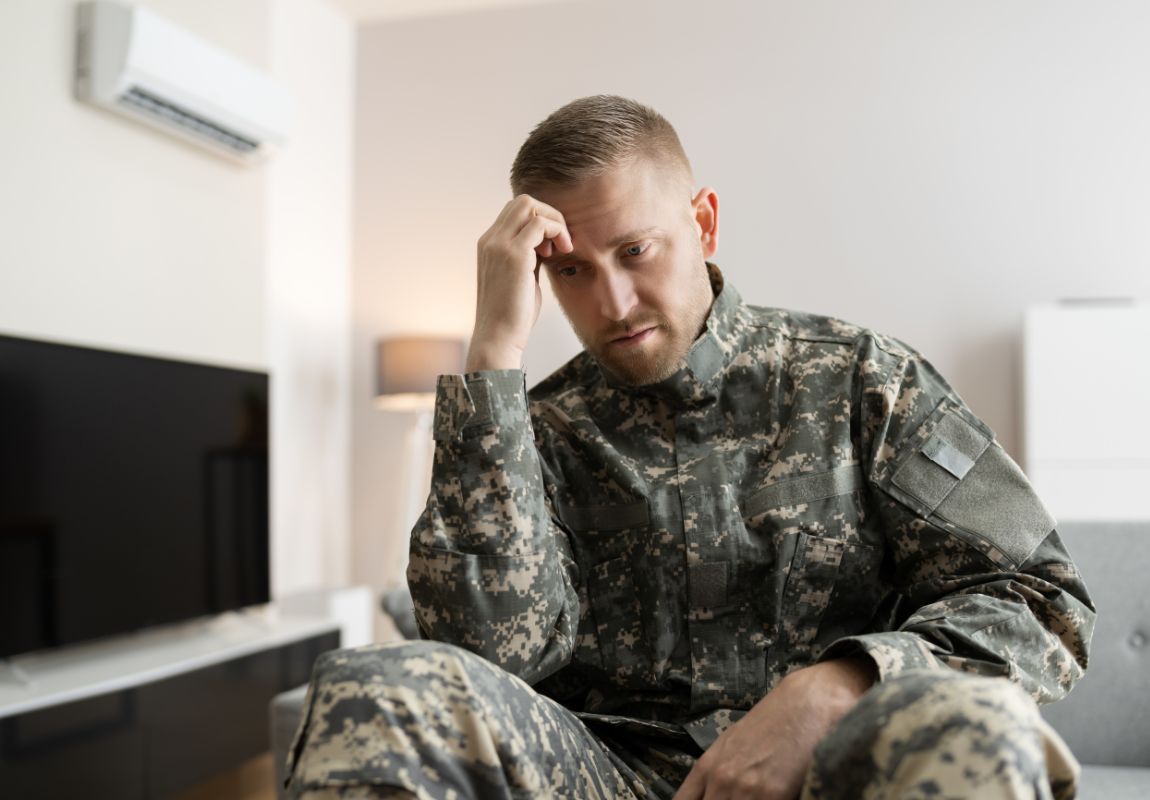Each of us has moments where we feel anxious from time to time. It could be having the jitters before a big job interview or a big presentation after you’ve been hired. You may feel nervous before that big final exam that can make or break your semester. Or your heart may race, your stomach in knots, over more pressing problems, like a major surgical procedure, financial worries, or frequent relationship conflicts.
For many, the anxiety may come, but doesn’t fade as it should. It’s when you find yourself asking, “Does anxiety ever go away?” that it could point to a bigger issue. Anxiety disorders are more common than we may think — the most prevalent of all mental illnesses in the U.S., they affect 40 million people, or 19.1%, of the population each year, says the Anxiety & Depression Association of America (ADAA).
How long does an anxiety disorder last? If you’ve been feeling symptoms that could point to a potential diagnosis, the truth is that they can vary in their duration and impact. The good news is that you can take meaningful steps to recover from any type of anxiety disorder. Keep reading to learn more.
What Are Anxiety Disorders?
Anxiety disorders go beyond occasional worry or stress, health conditions typified by a lingering sense of constant, excessive fear, worry, or even dread over everyday situations that can interfere with your day-to-day functioning. “Anxiety disorders interfere with daily activities and can impair a person’s family, social, and school or working life,” notes the World Health Organization.
Anxiety disorders can affect anyone of any age or gender. The ADAA says that women are twice as likely to be affected by most anxiety disorders as men, with anxiety disorders affecting nearly 32% of adolescents between the ages of 13 and 18.
Some common symptoms of anxiety disorder can include:
- A constant, uncontrollable worry or sense of panic over imminent danger, even in everyday situations
- Avoidance of fearful situations
- Feeling restless, irritable, or always on edge
- Difficulty focusing or concentrating
- Fatigue and insomnia
- Nausea and abdominal agitation
- Heart palpitations
- Profuse sweating, trembling, and shaking
Normal Anxiety vs Anxiety Disorders
Firstly, why do we get anxious? Anxiety is how we naturally respond to a potential threat. No matter how fearful it may seem, we’ve evolved for thousands of years to react with anxiousness and be cautious in certain situations as a way of ensuring our survival.
“When your anxiety response is working as intended, it can help you anticipate harmful events and activate fight, flight, or freeze, which is your built-in survival mechanism,” notes a study by PsychCentral.
But there’s a difference between this normal, healthy anxiety and an anxiety disorder. Normal anxiety is generally defined by being:
- Proportional to a given situation
- Temporary and short-lived, subsiding when the particular stressor goes away
- Manageable, not interfering with or impairing your daily life
In contrast, an anxiety disorder’s symptoms are much more amplified, characterized by some differences from normal feelings of anxiousness:
- Your reactions are disproportionate to the triggers
- Your anxiety causes significant disruption to your daily life, relationships, or work
- Your anxiety is intense, ongoing, and won’t go away, even when there’s no clear reason.
How Long Does an Anxiety Disorder Last?
The length and severity of anxiety disorder can vary from person to person. But one thing is certain: like any mental health disorder, anxiety disorders can become worse over time if left untreated. Certain factors can begin to explain the duration and intensity of an anxiety disorder timeline:
Your individual biology plays an integral role. Your neurological chemistry, hormonal structure, and personality may make you more prone to anxiety or panic attacks. Genetics may also play a role — do anxiety disorders run in your family?
Your life experiences can also determine how long an anxiety disorder may last. Chronic stressors such as work pressure, financial strain, or ongoing traumatic experiences (i.e., a conflict-ridden or abusive relationship) can trigger, prolong, or exacerbate anxiety disorder symptoms, but then they may lessen somewhat after shedding those stressors. Likewise, a strong support network of family and friends can lessen anxiety symptoms or reduce your likelihood of developing a disorder, and vice versa.
Your overall mental health and outlook play a role in the development and duration of anxiety disorders. Fatalistic thinking can lead to negative emotions, prompting anxious reactions — one process that a treatment like Cognitive Behavioral Therapy (CBT), for example, aims to resolve.
Access to mental health treatment also plays an obvious role in determining how long anxiety lasts. The earlier the intervention and the more consistent the treatment, the better anxiety disorder can be helped through therapy, medication, group support, and more.
Can Anxiety Be Cured?
Curing anxiety can appear elusive when suffering from an anxiety disorder; in fact, feeling despair that there’s no hope for extreme anxiety can create further anxiety.
The truth is that anxiety is part of the human experience, and thus, isn’t likely to be cured. Everybody experiences it naturally, even from time to time. “Anxiety is bound to make an appearance sometimes, such as when you’re giving a big presentation at work or when you have an acute health issue,” notes a Healthline study.
But anxiety disorder can be treated to make your symptoms more manageable to the point where they no longer significantly impact your quality of life, even if occasional anxious feelings still arise.
Looking for quality treatment for substance abuse and mental health that’s also affordable? Aliya Health Group's treatment facilities accept most major insurance providers. Get a free insurance benefits check now!
Check Your CoverageWill Anxiety Go Away on Its Own?
Does anxiety ever go away? Better yet, can anxiety disappear all on its own? Average anxiety arises and fades, ebbs and flows according to the presence of stressful situations and certain triggers — and we all may experience moments that are more anxiety-inducing than others.
In this case, mild anxiety will go away on its own. However, when asking if anxiety ever goes away without help, anxiety disorders rarely disappear completely without some sort of therapeutic aid. And research indicates that untreated anxiety disorders tend to lead to other problems down the road.
“An anxiety disorder often is not just an anxiety disorder. When untreated, it may progress to depression,” says Dr. Sandra Swantek, quoted in a 2025 American Medical Association (AMA) study. Anxiety and depression often co-occur; according to a 2022 study by the U.S. Centers for Disease Control and Prevention, about one in five adults experience anxiety symptoms (18.2%) or corresponding depressive symptoms (21.4%) within a 2-week period.
“Untreated anxiety has also been associated with elevated levels of cardiovascular disease, elevated blood pressure, and other medical conditions,” notes Swantek.
The AMA notes that in attempts to assuage or cope with untreated anxiety disorder, many people may also attempt to self-medicate through alcohol, substance, or drug misuse.
List of Anxiety Disorders
There are a few different types of anxiety disorders, each with its own distinct diagnosis:
General Anxiety Disorder (GAD)
General Anxiety Disorder involves constantly worrying — sometimes for no reason — but being unable to control it. If you have GAD, you might find yourself severely anxious about everyday matters like health, finances, work, or family, even when each of them is going well.
GAD is usually diagnosed if you’ve shown this degree of excessive worrying for at least six months and display a combination of physical, emotional, and behavioral symptoms. “GAD affects 6.8 million adults or 3.1% of the U.S. population, yet only 43.2% are receiving treatment,” notes the ADAA.
Panic Disorder
Recurrent, unexpected panic attacks are characteristic of panic disorder, a type of anxiety disorder that affects 6 million adults (2.7% of the U.S. population), notes the ADAA. Panic and anxiety attacks can be frightening since episodes of intense fear and discomfort are usually sudden and unexpected, accompanied by physical symptoms that may resemble those of a heart attack, like chest pain, palpitations, shortness of breath, trembling, and tingling.
The National Institute of Mental Health (NIMH) indicates that panic disorder tends to begin during one’s late teens or early adulthood and afflicts women more than men.
Social Anxiety Disorder (SAD)
Anxiety before a big date or having to engage in small talk with strangers at a party can make even the best of us nervous inside and stir up anxiety. And some of us experience shyness depending on the time and place.
But social anxiety disorder is much more. Someone with SAD will feel an intense and pervasive fear of situations that may involve being harshly scrutinized, evaluated or judged by others — whether it’s speaking in front of a group, meeting strangers, going to a job interview or a date, or even answering a question in school, talking to a cashier while shopping or using a public restroom, notes the NIMH. Consequently, a person with anxiety attacks from SAD may cloister themselves from situations with other people they believe will create embarrassment or distress, negatively affecting their work, school, or daily life.
Specific Phobias
Having a fear of flying, tall heights, enclosed spaces, spiders, needles at the doctor — they’re often marginalized because they appear so innocuous to most people. But these specific phobias are very real and very crippling to those who suffer from them. They may have little to no danger attached to them, but when exposed to a certain stimulus, you might experience immediate anxiety and try to avoid it at all costs.
With specific phobias, feelings of fear, dread, panic, and anxiety may arise from just thinking about going in an elevator (claustrophobia) or getting on an airplane (aerophobia). One hallmark of a specific phobia disorder, notes the Mayo Clinic, is knowing your fears are unreasonable or overblown, but you can’t control them. According to the ADAA, specific phobias affect 19.3 million adults, equivalent to 9.1% of the U.S. population.
Get confidential help from our addiction and mental health treatment facilities located across the United States. Call to join one of our quality programs today!
Speak With Our Admissions TeamProfessional Treatment Can Help with Anxiety Disorders
Curing anxiety would be akin to removing a necessary emotion that’s part of our human makeup. But treating anxiety that’s severe enough to become a disorder is possible to help you live your best life — to go out into the world and be among the people, places, and situations that once triggered you, with little to no sense of fear, of panic, of avoidance. And when triggers do show their faces, you’ll know how to react and respond with the coping mechanisms and tools that therapy gives you.
If you’re concerned about how long anxiety lasts, professional treatment can significantly improve anxiety disorder symptoms. One treatment is Cognitive Behavioral Therapy (CBT), a type of talk psychotherapy that helps you identify and challenge negative, unhelpful thought patterns that contribute to anxiety. CBT is designed to help you reframe that mental state into a more positive, self-affirming narrative.
Another value of treatment for anxiety disorder is taking part in holistic therapies. Trying yoga, meditation, expressive arts therapy, or adventure therapy with others in treatment — even if those activities generate anxiety in you — are excellent approaches to better self-discovery and healing your mind, body, and spirit, allowing your calm, confident self to shine during moments you’d normally be overwhelmed with anxiety.
Managing Anxiety After Treatment
Does anxiety ever go away? Even after treatment, some anxiety symptoms may materialize occasionally — it’s just a part of being human. Therapy teaches us not to be hard or judgmental on ourselves if we lapse, which is an important piece of advice in conquering therapy.
But if you’ve found treatment invaluable and worry about where to go after it ends, know that there are aftercare options to take advantage of through one of our treatment/rehab facilities. For instance, you have the option to attend booster therapy sessions when needed and stay connected with like-minded peers through further group therapy.
We can also connect you with support groups in your area if you’d like to pursue further self-care, such as anxiety groups offered by Emotions Anonymous and ADAA’s online peer support system.
Anxiety Disorder Treatment Near Me
How do you find the right professional mental health counselor who is a good fit for your needs? Aliya has therapy centers in nine states, where we never follow a one-size-fits-all approach; as anxiety disorders are diverse, so are you and your individual situation and symptoms.
Following an initial assessment, your treatment plan is tailored down to the type of therapy that works best for you, days and times of the week, and the trajectory of your schedule as part of your anxiety disorder timeline. In addition to various behavioral modalities and support options, medication management is also available after consulting with your counselor.
Our therapists are licensed, certified and approach care with compassion and a dedication to seeing you live your best life.
“How long does anxiety disorder last?” is a question only you can answer. If the idea of picking up the phone to inquire about therapy creates some of that familiar anxiety, it’s exactly the reason why you should do it. Call us today and trust that you’ll be glad you did. Take a brave step and imagine yourself, within just a few months from now, living your daily life unencumbered by anxiety. That’s how effective treatment can be.
If you have questions, we’re here to help 24/7.
- https://adaa.org/understanding-anxiety/facts-statistics
- https://education.nationalgeographic.org/resource/how-fear-and-anxiety-drove-human-evolution/
- https://psychcentral.com/anxiety/anxious-vs-anxiety#anxiety-vs-anxiousness
- https://www.who.int/news-room/fact-sheets/detail/anxiety-disorders
- https://www.healthline.com/health/anxiety/anxiety-vs-anxious#how-to-tell
- https://www.healthline.com/health/anxiety/does-anxiety-ever-go-away#does-anxiety-ever-go-away
- https://www.healthline.com/health/anxiety/does-anxiety-ever-go-away#does-anxiety-ever-go-away
- https://www.healthline.com/health/anxiety/anxiety-triggers#triggers
- https://www.ama-assn.org/delivering-care/public-health/what-doctors-wish-patients-knew-about-managing-anxiety-disorders#
- https://www.cdc.gov/nchs/data/nhsr/nhsr213.pdf
- https://www.hopkinsmedicine.org/health/conditions-and-diseases/generalized-anxiety-disorder
- https://www.nimh.nih.gov/health/publications/panic-disorder-when-fear-overwhelms#:~:text=What%20is%20panic%20disorder%3F,no%20clear%20danger%20or%20trigger.
- https://www.mayoclinic.org/diseases-conditions/specific-phobias/symptoms-causes/syc-20355156
- https://emotionsanonymous.org/find-an-ea-meeting/?gad_source=1&gbraid=0AAAAAClo09T5ieWplozhrrqRpB_yNRR2B&gclid=Cj0KCQjw5azABhD1ARIsAA0WFUEUPG4zEl-BZGdC_St1xoyDJbmSnsO69d6jjVDTh-uIsp7ZOxt2HeoaAhQcEALw_wcB
- https://adaa.org/find-help/support















